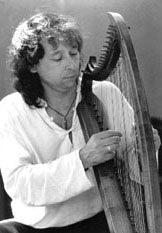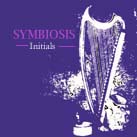Tulips
This is the very first tune Eddie ever wrote. At the time every Sunday we were playing on the Flowermarket in Amsterdam. As a joke, we played an old Dutch tune sometimes, called Tulpen uit Amsterdam (Tulips from Amsterdam) and replaced that by this one at some stage. We couldn't think of a name for the new tune at first, so we referred to it as 'Tulips' and stuck to that name since then.
Carrickfergus
This Irish song deals with a man who tells the listener about being homesick to the town Carrickfergus in Northern Ireland. At several times in history Ireland was so poor that people went abroad to look for work- and of course wrote music about that experience.
Back home in Derry
Although for us this is a completely different piece, it has the same story to it as Carrickfergus. On this recording you can hear the first (and last!) humble try from Eddie to play the tin whistle, a little flute that is being used a lot in folkmusic.
Lady Athenry
On the version Eddie put on the cd, we use a fairly modern approach to this Turlough O'Carolan piece. You can hear an electric bassguitar through a flanger-effect. Our first intention is to make music that we think sounds good, whereas a lot of bands try to get as close to the original as possible. Sometimes, people disagree with our approach, but most of the time, we get very positive reactions. We think, that the feel of the music is important- and not, the way it is played.
Baonopstekker
In the Scheepvaartmuseum in Amsterdam there is a replica from an old VOC-ship. The Dutch used to travel to Indonesia on such ships in the past for trading purposes.
On the replica in the museum, you could see a 'crew' (people dressed up in clothing from those days) to show the visitors how life was on board. Eddie was amongst them for a while, during which time he picked up the harp. In fact, this is where he taught himself how to play it.
Of course the seamen also played music during the long voyage, and 'Baonopstekker' is one of them. The way Eddie plays it is much slower than the original, though; it is really a dancing tune, as you can hear at the end of our version.
What a baonopstekker really is, we still don't know for sure; it might have to do with harvesting beans.
Only our rivers
This ballad tells the listener about the fact that Ireland has been invaded by foreign countries many times during its history. Therefor, the chorus tells you that 'only the rivers run free'. It has been one of our earliest tunes and we still play it regularly. We picked it up from Christy Moore.
Flow in time
When Eddie recorded this first cd, he used different sounds, trying to prevent making a perhaps less interesting cd. Therefor he also used nonconventional instruments such as electric guitar, keyboards and drumcomputer. In this composition these instuments have been used fully. Many people have commented on this song; many of them very positive, others less enthousiastic. As a result, we decided to record our next cd's either conventional or completely modern. Essence, the second cd, is the first of those. However, we still like both styles and are still very happy with 'Flow in time'.
Russian Breeze
Around 1989, Eddie used to play bassguitar in a bluesrockband named after a J.J.Cale-song called The Breeze. Together with the bluesharpist from that band, 'Mad' Mike Askin, he composed this tune. We thought it had a Russian feel to it and that's how the name came about. Mike plays a special B-minor bluesharp on this recording.
The clergy's lamentation
This piece is a not too wellknown Turlough O'Carolan tune. It's tranquility was a big attraction to us, but to be honest, these days we rarely play this one 'live'.
The recording of it was a nice project, but after that we hardly paid any attention to it anymore. However, we still think that the composition of it stands very much for our music; you don't need technically complex tunes to get a beautiful and strong effect.
The green fields of France
A true classic amongst today's Irish folkbands, where the singer talks to the grave of a young Irish soldier who died during the First World War. Many Irish were forced to join in with the English during this time. We always feel sorry for not bringing the powerful words to this song when we play it. But the melody itself, which is actually an old air called 'The isle of Man' is so beautiful that one can do without the words that Eric Bogle later put to it.
 |
Wonderful tonight
It was a challenge for Eddie to try and make an acceptable instrumental version of one of Eric Clapton's biggest hits ever. Being born in the sixties, he grew up with songs like this. Also, he wanted to try not to play and record only Irish melodies and 'typical' harptunes; we also like other musicstyles! On this recording, Eddie plays the hammer dulcimer from Harris Moore (Northern Lights) as well. |
John O'Connor
A lot of Turlough O'Carolan tunes carry the name of a person, such as this one. The reason for this is, that the tune was specifically composed for this man or woman. The harpers of O'Carolan's days were travelling around, usually by horse and with a pupil. The rich used to invite them to their castles to play at feasts, bring news, and sometimes to make a tune for the occasion of a birthday, wedding, etcetera. Nowadays, often all that is left from those people is just that tune.
Time is a promise/Crazy man Michael
In the early 70's, Sonny Condell and Leo O'Kelly made three succesful albums with their band Tir Na Nôg (the Celtic word for Atlantis, the land of eternal youth). From their first LP we took Time is like a promise. These days, both Sonny and Leo regularly perform solo, also in Holland.
The second melody is derived from a story about a man that drinks so often, that his love throws him out. He gets so angry that he kills her and from sorrow Michael turns into crazy man Michael.
Afscheid
The original title for this Swedish seashanty is Vem kann siglen uten vind, which means 'Who can sail without the wind'. Aboard the VOC-replica that we mentioned in the piece about Baonopstekker, Eddie got to know it under the Dutch name Afscheid, which means 'farewell'. An English translation for the words is the following:



